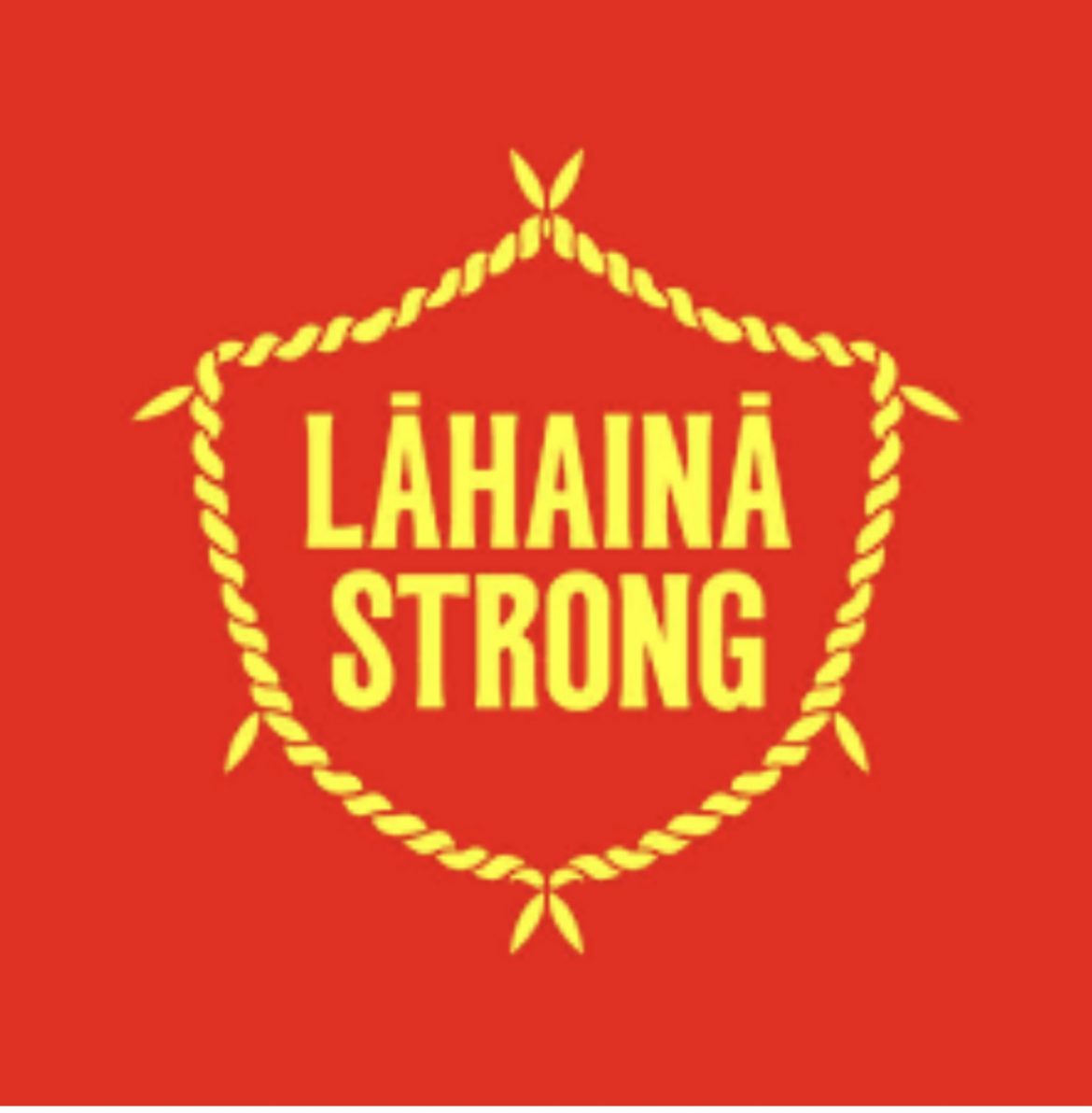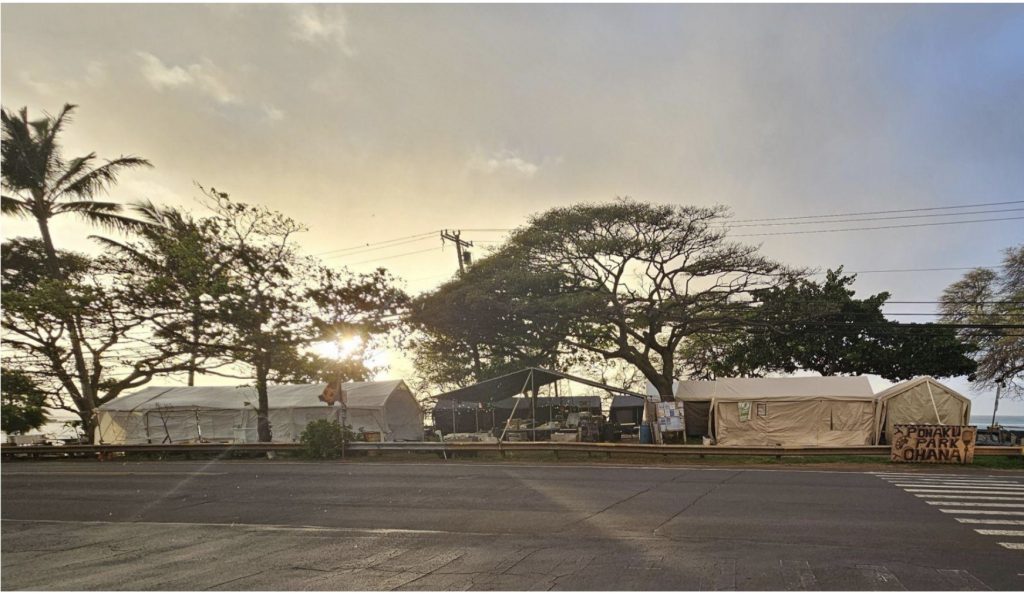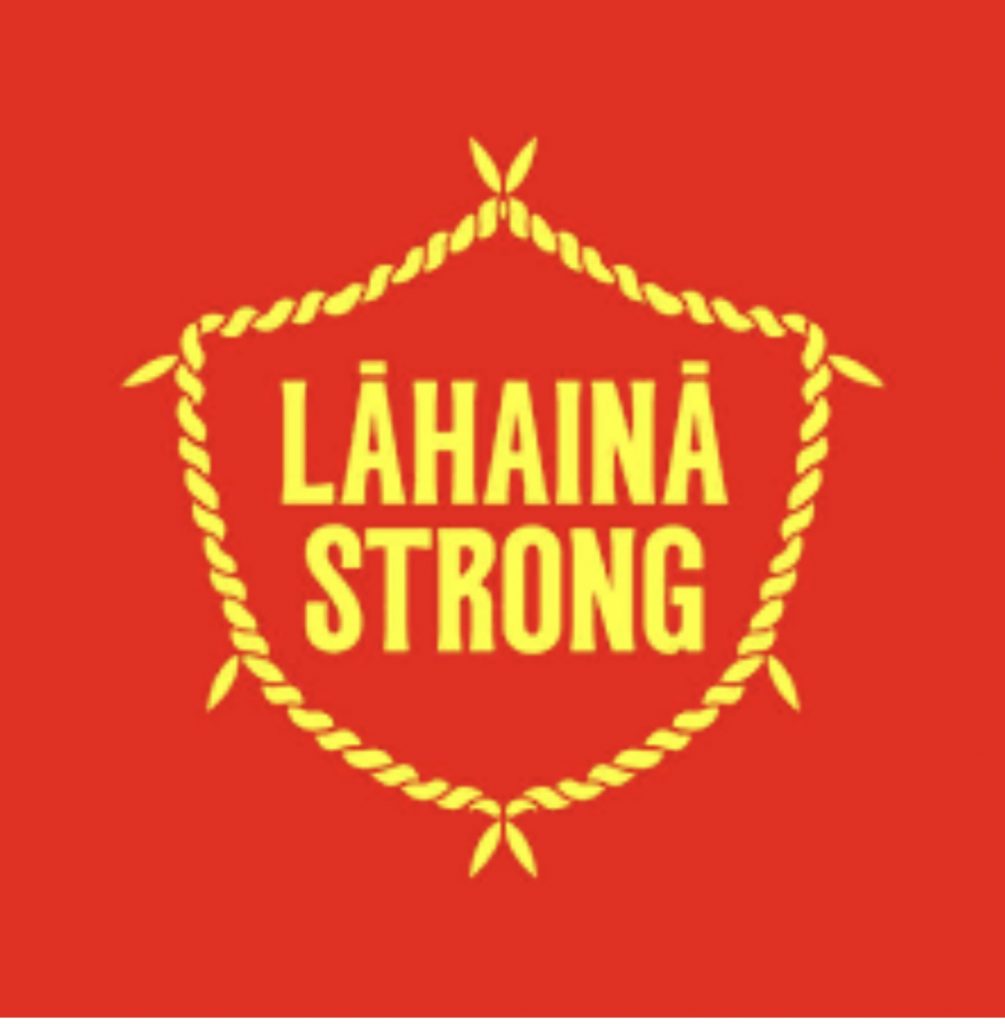
By: Brittany Drouant
The West Maui community hubs are an essential resource for the devastated Lahaina community, including UHMC students who live on the west side. After the horrific August 8 fires last year that decimated historic Lahaina town and its surrounding homes, these hubs popped up as a response to the community’s needs. I took a deeper look into some of these sites, including the services, resources and challenges, the climate of the community and the next steps for Westside residents who rely on the hubs. Representatives from Pohaku Park ‘Ohana Hub, Napili Noho Hub, and the now-shut-down Honokowai Beach Park Hub agreed to speak with me and answer questions.
In a time of urgent need, Lahaina’s community rallied together to ensure that no community member was, or is, left behind. Days after the fire devastated Lahaina town, the Westside residents jumped into action, gathering and distributing vital supplies such as food, water and clothing. They began organizing themselves into volunteer groups and hubs of information and resources to provide for the upcoming needs of essential living items. As a lifeline, network and extended ohana for the citizens of West Maui, these hubs provide everything people need, such as food, water, clothing, hygiene items, baby items, medical care, and many other essentials, as well as information about replacing important documents, how to apply for assistance and much more. The hubs are entirely run by volunteers who give their time and aloha to our devastated community. They serve the areas north of Lahaina, beginning with Kaanapali and continuing to Kapalua – a stretch of approximately five and a half miles – including the Honokowai, Kahana, and Napili communities. The span from Kaanapali to Napili is now even more densely populated with the large influx of fire survivors.

Pohaku Park Ohana Hub is located at Pohaku Beach Park in Kahana, locally known as “S-Turns.” Daily, they serve 200-400 people affected by the fire with what Manu Akana calls “basic living needs and a little extra.” Pohaku Park Hub offers the basics such as food, water, and clothing, but they also have harder-to-find items such as adult diapers, walkers and playpens. Non-governmental organizations and private citizens donate supplies and services. An assortment of services, including medical care provided by MODO For the People, can be found here. Akana says, “Donations come from everywhere.” He cited Common Ground Collective as a major contributor of fresh and prepared food, Maui Food Bank, Hungry Heroes Hawaii, other local nonprofits, churches, community members and even tourists.

Napili Noho Hub, located at Napili Park, serves 150-250 families affected by the Lahaina fire daily. A source at Napili Noho says their anonymous donors and selfless volunteers are the backbone of their organization. Tents are denoted as “stores” for different goods, and 40-foot storage containers sit at the side of the field – the overflow cache of donations. Napili Noho also offers lomilomi, acupuncture, naturopaths, and yoga classes. For a complete list of the ever-changing range of services and information at Napili Noho, residents can visit napilinoho.com. Both hubs offer various commodities like fresh produce, canned and dry goods, and water. They also offer health and body services, mental and spiritual care and keiki services. Unanimously, they agree: “As long as the community is in need and the resources are there, so are we.”


Not every hub has had a positive outcome. One example is the Honokowai Beach Park Hub. A previously bustling site for one of the first community hubs opened after the fire; it has since been broken down. Most supplies have been dispersed to other hubs, leaving one lone POD container and a small keiki tent for the people of Honokowai. The question that has been burning through this reporter’s mind is, why did one of the most frequented hubs shut down?
In order to get to the bottom of this, I interviewed Jon Kinimaka, one of the co-founders and unofficial leader of the Honokowai Beach Park Hub. He began with the story of how the hub came into being. Walking into Lahaina town the day after the fire raged through, he witnessed the devastation and loss of life that had occurred. When asked why he would do this, he said, “I had to see for myself that my house was gone, that my town was gone – that what everyone who had fled north told me what had happened had really happened.”
Returning to Honokowai after seeing the gruesome scenes, he wanted to do something to ease people’s suffering. Help began flooding in – from Molokai, Oahu, other parts of Maui and the mainland. Donations were accepted, sorted and distributed. With a constant influx of fresh supplies, an organized site became necessary. Kinimaka and friends arranged a spot at Honokowai Beach Park, and the Honokowai Hub was born.

Drama caused the downfall of this valuable resource. In-fighting ensued, and destructive elements found their way in. I was told in our interview that drugs, alcohol, prostitution, extortion and theft were among some of the worst offenses happening in the community’s place of help and hope. Kinimaka said, “Eventually, enough was enough, and I had to step away from what became a volatile situation.” When he left, the hub remained open, helping people who came daily seeking services and supplies. But, shortly after his departure, continued friction caused everything to fall apart, and the hub was dismantled.
The climate of the community is one of vulnerability and distrust. The general consensus is the government is letting its citizens down. “We expected the government to fast-track everything in this state of emergency,” said Akana, “The answer should be ‘Yes’ to everything because we aren’t asking for things we don’t need.” Rents are skyrocketing, and people are being evicted to allow displaced families to move in, allowing more lucrative FEMA money to cushion landlords’ bank accounts. Because these atrocities are being allowed to happen unchecked, and the path forward is still undefined, citizens are distrustful of the government.
What are the next steps? To get answers, I tried calling West Maui Representative Tamara Paltin but have not received a reply. Maui County Council members will urge Mayor Richard Bissen to devote unused COVID funding to help fire victims on Feb. 7, 2024. Senator Angus McKelvey wholeheartedly supports the proposal of a modular temporary housing community in Kaanapali that will keep Lahaina residents on the Westside. These are just a couple of options in the works for Lahaina.
Akana encourages all of Maui, “Go on your computer, or even your phone, and write to your senator, representative, the governor, and anyone else in power that you can think of. The only way we going get change is if we make um hear us.”
In this time of uncertainty, the Westside hubs are a shining beacon of help, hope and aloha. All Westside hubs are looking for and accepting volunteers, donations and resources. Maui residents who want to be of service are encouraged to donate time or resources to help Lahaina heal.


